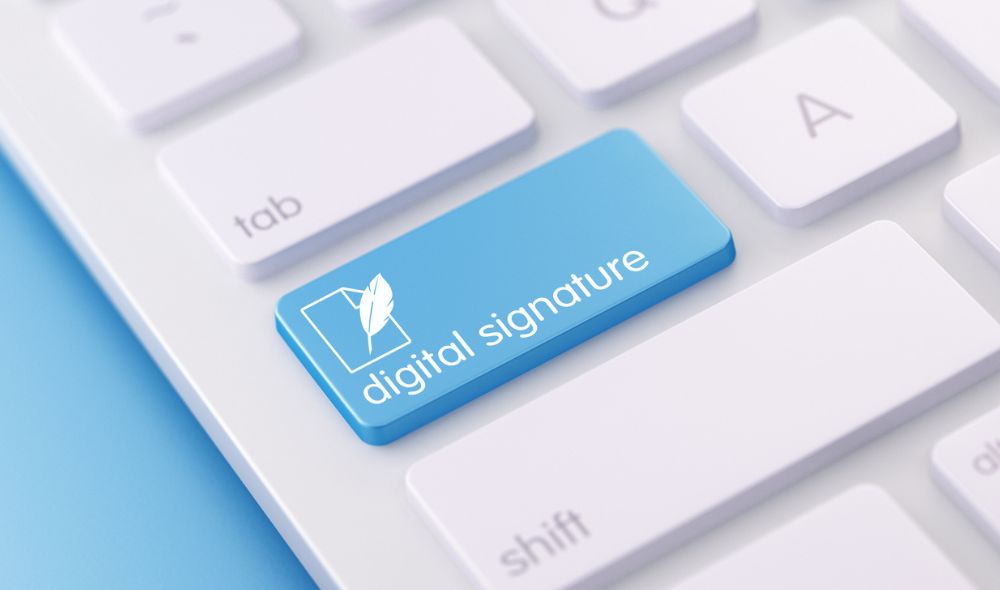In recent years, both our personal and professional lives have increasingly shifted towards a more digitized and paperless environment.
The rise of remote and hybrid work models shows that many companies are working, alongside sustainable business practices, to minimize corporate consumption. One effective strategy to achieve these goals is the adoption of electronic and digital signatures, which significantly reduce the reliance on physical documents and in-person agreements.
Digital signatures help to ensure the integrity and authenticity of electronic documents, while streamlining processes and enhancing security. As more enterprises recognize the benefits of going paperless, digital signatures are becoming an indispensable tool in the modern business landscape.
What Are Electronic and Digital Signatures?
To understand the importance of digital signatures in business use cases, it’s first crucial to understand the distinction between electronic and digital signatures. Both serve the purpose of signing documents electronically, but they differ significantly in terms of security and functionality. While every digital signature is an electronic one, not all electronic signatures are digital. So, what’s the difference?
Electronic signatures (or eSignatures) are a broad category that encompasses any electronic process signifying an agreement to a contract or document. They can range from a simple scanned image of a handwritten signature to a typed name at the end of an email. eSignatures are designed for convenience, allowing documents to be signed quickly and easily from anywhere in the world. Many eSignature platforms offer features like creating and saving a personal signature for repeated use, making the process even more efficient.
However, while eSignatures are user-friendly and expedite the signing process, they do not inherently ensure a document’s integrity or provide strong identity assurance. This is where digital signatures come into play. Digital signatures are a specific type of eSignature that use cryptographic techniques to ensure the authenticity and integrity of a document.
Digital signatures are based in Public Key Infrastructure (PKI), which uses a pair of keys – a private key and a public key – to encrypt and decrypt data. When a document is signed with a digital signature, the signer’s private key creates a unique encrypted code that is attached to the document. This code can only be decrypted by the corresponding public key, which verifies the signer’s identity and ensures that the document has not been altered since it was signed.
The security provided by digital signatures makes them legally binding and highly reliable. They offer a level of assurance that simple eSignatures cannot, as any attempt to tamper with a digitally signed document is immediately detectable. This makes digital signatures an essential tool for enterprises who need to protect sensitive information and ensure the validity of their agreements.
How Are Digital Signatures Being Used?
Digital signatures are adopted across various industries and public sectors to streamline bureaucratic and administrative processes. Some examples of industries benefiting from digital signatures include:
- Financial Services and Real Estate: Digital signatures streamline the signing of applications, agreements, and compliance documents. They provide a secure and efficient method for executing contracts with reduced risk of fraud by ensuring the authenticity of transactions. This is particularly important for loans, mortgages, and other financial instruments where security and accuracy are paramount.
- Human Resources: Manage documents such as onboarding forms, employment contracts, salary agreements, and termination paperwork. This not only speeds up the process but also ensures that sensitive personal data is securely handled. Digital signatures help maintain the integrity of these documents, providing a clear audit trail and reducing the likelihood of disputes.
- Government and Public Sector: Enhancing the efficiency and security of their operations. From processing permits and licenses to managing public records and citizen services, digital signatures ensure that documents are authenticated and tamper-proof. This works to maintain transparency and trust in public administration.
- Legal and Compliance: Used to sign contracts, agreements, and other legal documents. They provide a legally binding and verifiable method of signing, which is crucial for maintaining the integrity of legal processes. Digital signatures also help in meeting regulatory requirements and ensuring compliance with industry standards.
- Healthcare: Manage patient records, consent forms, and other critical documents. With the risk of cyberattacks in healthcare higher than ever, it’s important to ensure that patient information is securely handled and that the integrity of medical records is maintained. Digital signatures also facilitate faster processing of documents, improving overall efficiency in healthcare administration.
- Education: Handle student records, enrollment forms, and administrative documents. This reduces paperwork but also ensures that records are securely maintained and easily accessible. Digital signatures help in improving the overall efficiency of educational institutions.
Digital signatures are offering enhanced security, efficiency, and compliance across a number of sectors. As more industries recognize their benefits, the adoption of secure, trusted digital signatures is set to continue growing.
Why Are More Enterprises Adopting Digital Signatures?
The 2020s have brought significant changes to enterprise working models as businesses adapt to an increasingly digital landscape. The automation and digital processing of administrative tasks have created more flexible working environments, and many organizations are now catching up to this trend and are benefiting from the sustainability and cost efficiency of digital signatures. By reducing the need for paper, businesses can save on both material costs and the associated expenses of handling physical documents.
The most important advantages that digital signatures offer to enterprises however, is security.
Because they are founded within PKI, digital signatures can support businesses in their compliance policies by securely managing associated data and documents and tying it to trusted identities. This ensures the protection of sensitive information for employees, clients, leaseholders, and others, safeguarding enterprises from potential non-compliance penalties.
Unlocking the Power of Digital Signatures for Your Business
Digital signatures offer a transformative solution for businesses seeking enhanced efficiency, security, and credibility, all while reducing costs. We’ve highlighted the key advantages and applications of digital signatures, but there’s many more benefits that your business could benefit from with a document signing solution.
To start taking your business to the next level and implement easy, fast and secure signing solutions tailored for your business, visit our website and talk to our representatives, so we can find the perfect solution for you to empower your organization with seamless and secure digital signing capabilities.
Unlock the power of digital signatures with GlobalSign’s Document Signing Solutions







